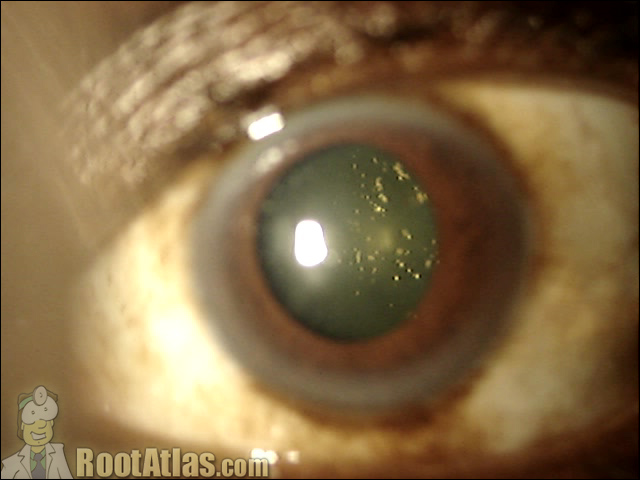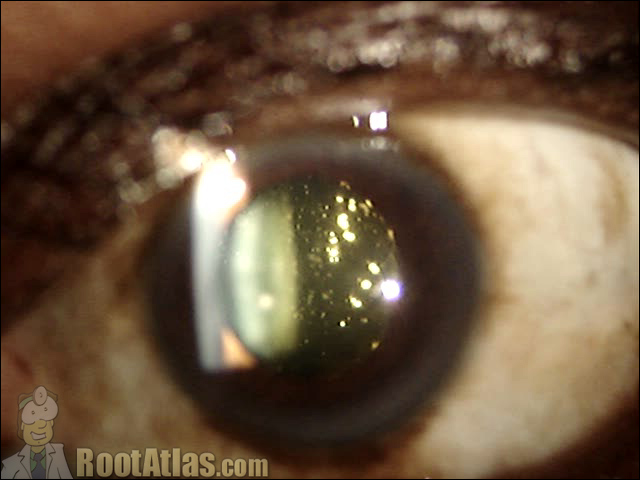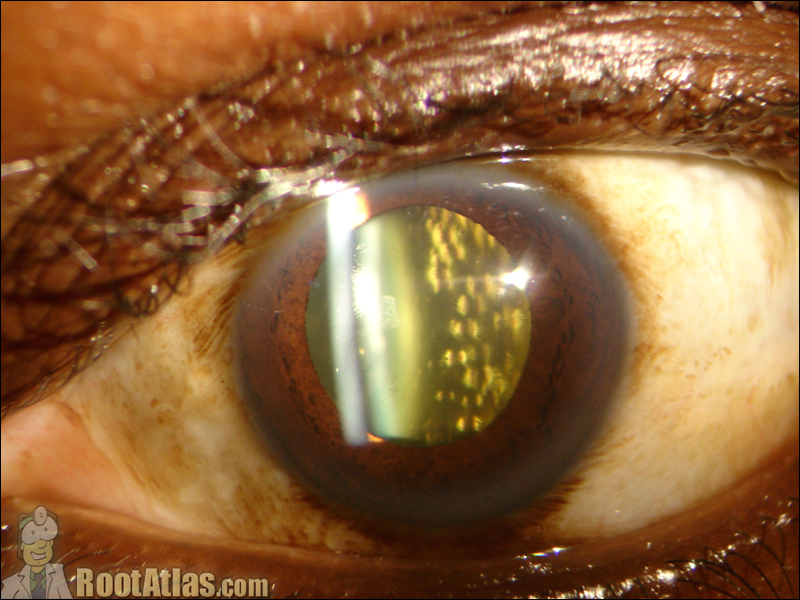Video: Asteroid Hyalosis
Asteroid hyalosis describes white floaters in the vitreous humor of the eye. These bodies are different than the typical floater, and usually don’t cause visual disturbances. They are caused by calcium soap deposits and can be associated diabetes, hypertension, and high cholesterol.
Though usually visually benign, these rarely cause significant visual disturbance. The opacity usually affects the view into the eye more than the patient’s view outward, such that a vitrectomy may be required if more serious retinal disease exists that needs to be treated/watched by the ophthalmologist.
– Occurs twice as often in men than woman
– Usually found in people over 60 years of age
Download this video
To download this video, right click on a link below and choose “Save Target As…”
asteroidhyalosis.wmv (5.2 meg, Windows video file)
Screencaptures




excellent !!!!
I started seeing a floater with my left eye in November 2007. I went to an ophthalmologist who told me I had vitreous detachment (eye floater). I had never heard of eye floaters before. He basically told me there was no cure for eye floaters and that I would eventually get used to it and it would become less noticeable. Well, I knew there was no way I would get used to that, since I use computers all the time and I’m an avid reader. I then did some research online and came across an NBC article about Dr. XYZ (removed by editor), who treats eye floaters with laser. Dr. XYZ happens to be 30 minutes from where I live, so I decided to give it a try and see what he would say about my case. After checking my left eye, Dr. XYZ determined that my floater would be difficult to treat and he couldn’t guarantee a very successful rate of success, since the floater was way in the back of the eye. He told me the success rate in my particular case would be 0 to 80% and there was a risk of pushing the floater further back, thus making it even more noticeable. Well, it would be the risk or living with the current floater, so I decided to give it a try. I’m VERY happy with the results. I consider my improvement to be 90%. I usually don’t see any floaters when using the computer anymore and when I’m reading I never see them either. The only time I see floaters now are when I look at a very bright background or on a very bright sunny day, but they’re still less noticeable than the big floater I had before. I would do it again, if I ever have another floater. It’s been truly a blessing to be able to see things again without a floater being there all the time! I hope other people will not listen to their ophthalmologists’ suggestion that there’s no treatment for eye floaters and will benefit from this procedure. Only those who have eye floaters truly know how annoying and distractive they can be!
Editor’s Response: Thank you for commenting, Mark. I’d would like to state right now, however, that using a laser on floaters is NOT a good thing, and should not be considered a valid option for dealing with them. It sounds as if YOUR laser went well, but you are lucky that the laser shockwave did not cause a retinal detachment.
There are many things that CAN be done in medicine, the question becomes SHOULD they be done. Vitreous laser for visual floaters falls WAY WAY WAY outside of the accepted standard of care in ophthalmology. It is not a procedure I (nor any other ophthalmologist that I know) would perform on any patient. The risk of creating a retinal detachment in an otherwise healthy eye is unacceptable. Thank goodness yours ended up ok.
Reply/question to Editor: it appears a double standard that the opthalmological profession, when applying its skills and technologies to “healthy” eyes, strongly promotes Lasik but frowns upon laser treatment of troubling, persistent vitreal opacities. Understood that in the latter case the laser is focused on a point closer to the retina, but Lasik is presented as benign and cosmetic when it is not uniformly so and subjects a “healthy” eye to actual instrumentation and cutting/lasering beyond what occurs in a floater procedure.
Do you dispute the claims of the laser floaterectomy practitioners that the available, albeit limited, world literature and experience in this procedure has resulted in nil retinal detachments?
A good point Bruce, and perhaps one of the reasons I’m not particularly interested in performing LASIK at this time. Messing up potentially normal eyes is not the reason I went into medicine. I’ve had LASIK however, and am glad that there are doctors performing this surgery as it has improved my quality of life. The public perspective of Lasik surgery is generated by a few aggressive surgeons, and does not necessarily reflect the opinion of the profession. Despite some misgivings, I still feel that LASIK is still a valuable surgery for many people, but the risks need to be emphasized.
Now … to your comparison of LASIK with intra-ocular laser:
The major complication risk from lasik I’ve seen quoted as 1 in 8000 (0.012 %).
The risk of complications with INTRA-ocular YAG laser (for floaters) may be much higher. Some report the rate of retinal detachment after a Yag capsulotomy (a similar type of laser used for blasting floaters) at almost 1%. This is orders of magnitude more risky than lasik. This risk may be even higher with floater-laser … or it may be less as the shockwave occurs further from the vitreous base.
Like any other surgery, it is the person suffering from floaters who must decide if their symptoms warrant this kind of risk. If the floaters are so bad that they can’t function, and they understand they may lose vision, than so be it. People should have control over their own health and destiny.
The difficulty will then be to find an eye doctor willing to take on the legal/professional liability of performing this procedure. Despite a few bad apples, the vast majority of doctors are good people who want to do the best for their patients – and I would venture that the vast majority of them would NOT do this procedure.
Medicine moves quickly, so perhaps this procedure will be perfected and proven to be a reasonable low-risk treatment in the future.
Many thanks for your measured and quick reply. Mark’s original comment represents a fortunately successful case (hoping this remains so without the later development of complications – would be happy to see a follow-up comment from him), but less positive outcomes have been anectodally reported in similar forums (mostly lack of efficacy, increase or return of floaters).
In any case, it certainly strikes as prudent to wait at least 9-12 months before even considering laser treatment of floaters (for hopeful spontaneous improvement/resolution), and even then to obtain a 2nd or 3rd opinion before deciding upon such an undertaking.
Thanks again.
Well said, Bruce. Thanks for posting!
really i am learning in this website and its usefull for optometrist and opthals
EXCELLENT!! Thanks alot for exlaining this for me. My eye doctor said it was nothing to worry about.
Dear reader I am 37 now i have eye floater on my right eye, i have noticed first in 20005 and ever since it has beeb growing more and my eye is almost cover completly. could anyone me help?
Dear reader I am 37 now i have eye floater on my right eye, i have noticed them first in 20005 and ever since it has beeb growing more and my eye is almost cover completly now. could anyone me help? My our local hospital told me that they would not recomend me to have a surgery eye and even if i did the surgery there is no grantees for success. Although i can see well now i am worry about in the near future.
what shall i do?
Freeda
very good quality photo & really beneficial to us (Medical student)
thanks for this photo!!
hi, i am 55 years old and had this for 9 years in my right eye. my husband and i live in the dark…lights, sunlight i can’t stand..i don’t have floaters, mine stand still, just gray/black spots when i look at anything
I am a 43 year old female who has asteroid hyalosis in my left (diagnosed by both my optometrist and Opthamologist). Both said that it would get better or become less noticeable but this is not the case. It seems to get worse every day and really bugs me. Although you do not seem to advocate laser surgery, your profession is not offering any other options. I don’t know if the Laser Doc is legit but at lease he is trying. What are all of the posting docs doing to offer relief to your patients?
Vitrectomy for symptomatic vitreous floaters is an accepted treatment, but must be weighed against the risk of complications including cataract, vitreous hemorrhage, retinal detachment, and endophthalmitis, among other potential risks. Many patients, particularly those with asteroid hyalosis, are very appreciative of the treatment, and report they would readily have it done in the second eye, if it is also affected.
Hi, I woke up with very large floaters in both eyes. I don’t know how I’ve lasted nearly 4 months . It’s that bad ! When I’m looking past s window the floaters seem to turn White and blurt so i get a flash in my eye as it passes . Does anybody els get this. I. Going to have to have laser blast them. There is no other way. Can anybody understand what I’m goin through. Coz it feels like nobody does. Pls help!!!!!!!!
I’m 69 years old and have floaters in my right eye, with all the information I’m getting I’m real concerned about having the laser surgery, but these floaters are affecting my vision and bothering me very much…. what does anyone think about this procedure if they’ve had it done and would they have it done again?
i was diagnosed to have asteroid hyalosis OD 3yrs. ago.i was given eye drops which lasted for 6mos. these past few days,i noticed my right eyesight to be increasingly blurry due to an increased number of floaters.i can no longer read the plate number of the car in front in a traffic stoplight with my affected right eye.is a vitrectomy warranted at this point?
sucks
I’m 63 years old and my eye doctor has told me i have Asteroid Hyalosis for years now. Matter of fact she told me to “Googel” on the name, thats how i found this site!
I don’t see any problems with my eye sight,and after having it for years, maybe even my whole life!
I’m thankfull that my eye doctor told me of your web site.
I will continue to research it myself to find out more information. Thank you, Bernard
I am 60 years old. I have had floaters and Asteroid Hyalosis for ten years now in both eyes. It has slowly gotten worse, and is now a tremendous hinderance in my vision. A vitrectomy has been recommended, which I am hesitant. Is anyone working on a cure for this condition? I do not have diabetes. hypertension, nor high cholesterol. There are so many people who are dealing with this challenge. There seems to be no help, other than a vitrectomy or lazer surgery.
I am 75 and have had a number of conditions, particularly in my right eye including two trebulectomies. Of all the problems, asteroids hyalosis are the most troublesome. Other than surgery, is there some form of treatment. I do not suffer from any of the conditions which are typically considered causal.
I have had these for years, I’m 72. From what I have read they are yellow. Mine are grey and some black with tails. I now have some idea what is going on in my right eye.
I just turned 60 and today I was told about Astroid Hyslosis. I had never heard of it, despite having read a lot about all sorrs of subjects. America has ageing population and I so oftern wish that our media, especially, TV, addressed more of these health issues so that we know and understand all these different conditions as we get older. Information and prevention is the key!
I looked ateroid hyalosis up today because I recieved a copy letter from my consultant – and apparently it was found in my right eye in 2007 !!! well today is the first I’ve bloody heard of it – after reading other posts it does explain the littlr floaters I get in my right eye and I’m furious 🙁
I am diabetic and 32
Is this going to get worse?
i am diabetic 43 had if for 37 years. Went for my routine eye check and was advised i have asteroid hyalosis in my left eye. sometimes i feel something but then i wear contacts so i am not sure if it is bothering me. For now i wont do anything but it seems it happens to diabetics right?
i have floaters that appear as blck tangled or curly long pieces of threads. They move as I change the direction of my gaze. Recently my left eye, the one which is affected by these floaters, has a new solid looking shape that is in my central view and shows up when the eye blinks. To my surprise I just noticed it shines with a fluorescent outline when my L eye blinks.